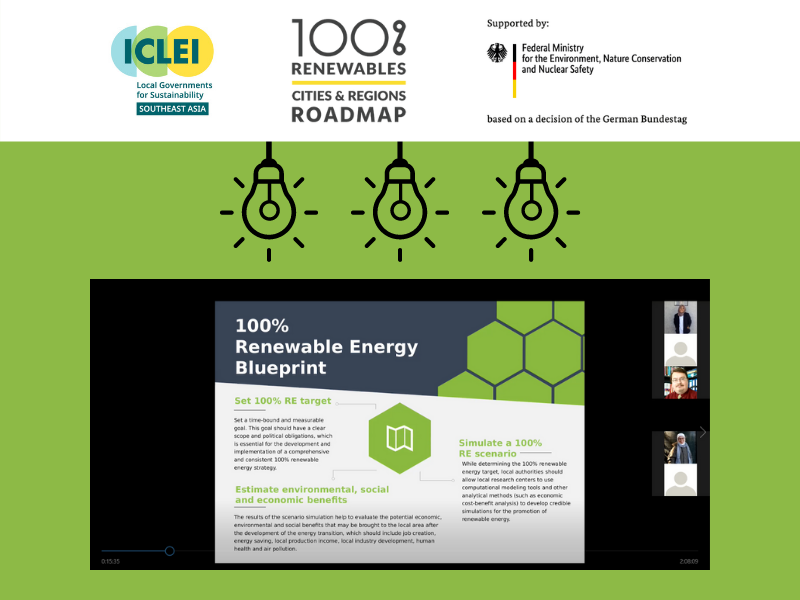ICLEI introduces 100% renewable energy transition toolkit to West Nusa Tenggara
ICLEI introduces 100% renewable energy transition toolkit to West Nusa Tenggara
ICLEI Indonesia organized a workshop of 100% Renewable Energy (RE) Building Blocks for the 100%RE’s Project Implementation Team (PIT) in West Nusa Tenggara. The workshop aimed to introduce an applicable tool for setting a 100% RE target including its necessary steps for achieving it.
Jakarta, Indonesia – ICLEI – Local Governments for Sustainability Indonesia last 29 June 2021 hosted a virtual workshop introducing the 100% renewable energy (RE) toolkit to various stakeholders from West Nusa Tenggara in an effort to facilitate the region’s clean energy transition.
Called the 100% RE Building Block, the toolkit guides policymakers, local authorities, and community champions in the development of their own 100% RE commitments by defining clear targets and formulating various RE efforts and strategies.
Additionally, it provides practical information on making the 100% RE transition sustainable in the long term. The toolkit is developed by the Global 100% RE Platform, a coalition of several global institutions, including ICLEI.
The 100% RE Building Block specifically consists of 10 critical points covering socio-economic, regulatory, environmental, community behavior, and awareness aspects.
Rian van Staden from the Global 100% RE Platform also highlighted the toolkit’s highly localizable nature. “The local government can incorporate local content to formulate the strategies, implement the action, and conduct monitoring and evaluation on their progress,” said van Staden.
He further discussed that in order to determine a 100% RE target, local governments should have deep understanding of their region’s characteristics and potentials, including both natural and human resources. Local governments should also collaborate with research institutions to simulate various scenarios for achieving an ambitious 100% RE target through the use of specialized modeling tools.
Meanwhile, Saladin Islami, ICLEI Indonesia Project Officer for the 100% Renewable Energy project, explained that ICLEI has established a project implementation team (PIT) to help the region’s RE goals. The PIT is composed of relevant stakeholders from various departments and institutions.
Aligned with the 100% RE toolkit, this step encourages stakeholder cooperation and collaboration in providing data and insights; developing actions and strategies, and disseminating knowledge.
Finally, while van Staden stressed the critical role of community participation in creating transition strategies, especially at the grassroots level, Niken Arumdati from the Energy Agency of West Nusa Tenggara stated that people still consider energy transition as a government and not a community responsibility.
To overcome this challenge and encourage public participation, van Staden recommended the conduct of public consultations and close communication with key community leaders and associations, especially those with deep concerns regarding energy transition and renewables development.
The workshop was a part of capacity-building activities for 100% RE PIT members.


